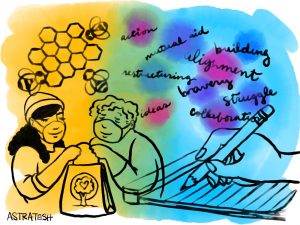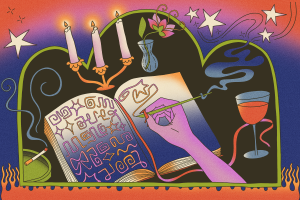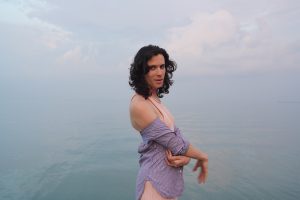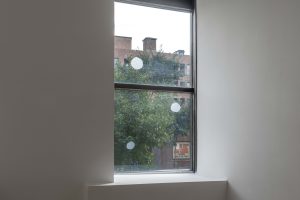“Beyond the Page” digs into the process and practice of writers and artists who work at the intersection of literary arts and other fields. For this installment, I interviewed Fawzia Mirza — actor, writer, producer, and “artivist” — about the relationship between her writing and performance, her creations’ many forms and media platforms, the role of comedy and collaboration in her work, and how she hopes her work impacts others. Our conversation took place remotely, with Fawzia responding via audio recording to a set of emailed questions.
Find Fawzia on Twitter and Instagram @thefawz. “The Red Line” premieres on Sunday, April 28, on CBS. This interview has been edited for length and clarity.
Marya Spont-Lemus: I first became aware of your work several years ago, when you emceed TEDx Windy City, at which two of my students were speaking. I thought you were such a charming, energetic, bold, incisive yet kind and generous host, and it was so lovely to officially meet you a few years ago and to discover that you’re just as smart and sincere and present off-stage. Since then, I’ve seen “Signature Move” (your first feature film!) and a number of your short films — many of which you’ve written or co-written as well as starred in — and gotten to know you a bit through other things around Chicago. There are so many facets to your artistry and your thoughtful work in this world.
For these reasons and more, I wanted to talk to you for “Beyond the Page” — especially because it seems like writing is central to your practice, yet I haven’t seen a lot of attention to that part of your process. So, in particular, I’d love to learn more about how writing factors into your creative work, as well as how aspects of your personal and professional experience inform that.
To begin, I’d love to just hear a little about you. How do you think about your practice, what is your work about to you, and what you hope your work does in the world?
Fawzia Mirza: My mission as an artist is to use comedy and art and storytelling to break down stereotypes across different communities, in many of my identities — race, religion, class, gender, orientation. I’m an actor, I’m a writer, I’m a producer. I think of myself as an activist and my art as activism — I’m an “artivist.” My work is about changing the narrative. I also hope that my work helps amplify the voices of my various communities and intersectional spaces that I occupy and, honestly, I hope that it can both empower others to create their own work and tell their own stories. I hope that my work can make people feel seen and represented and a little less lonely in the world.
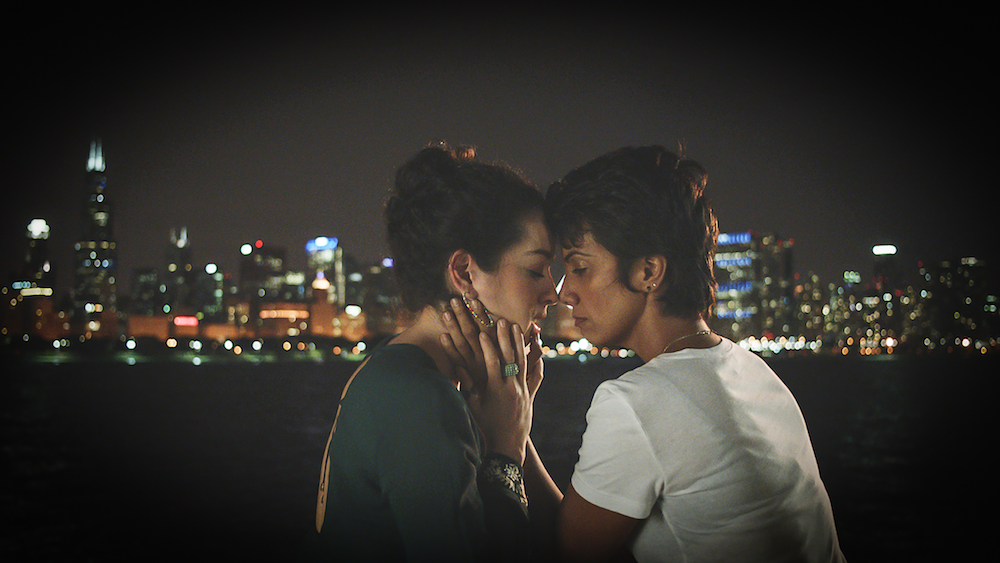
MSL: How did your interest in writing develop? And how do your writing and performance practices interact with each other?
FM: I actually was a lawyer and started taking improv and acting classes while I was lawyering — I was a litigator by day, taking these classes at night. Eventually I left the law, and I started doing an educational touring show based out of Chicago called “Sex Signals,” which was a comedic show about sexual violence prevention. Doing that really shaped my ability to see both rape culture and misogyny in play in our culture and also the great impact of comedy as a tool to break down stereotypes and to have really important, compelling conversations on divisive topics and social issues.
But I didn’t start writing until I’d left the law and I was auditioning and doing this other kind of activist performance work. The roles I would go in for just weren’t really telling stories of my communities or didn’t feel authentic. The roles didn’t feel like they represented my actual experiences as a Muslim person or a queer person or a woman or a South Asian person. And I was often being told that I wasn’t “enough” of any of those things that I actually was — like I wasn’t South Asian enough or lesbian enough or Muslim enough. So I thought, “You know, I need to create those roles and tell those stories” — so that I feel represented and so that I can cast myself instead of waiting for someone else to cast me, or instead of waiting for someone else to tell my story, who might not even be from those spaces or have those experiences. That’s kind of how I started writing. The writing and the performance have been deeply intertwined for me from the beginning because I started writing for myself to play the roles.
Video: “The Muslim Trump Documentary: Ayesha Ali Trump”: Directed by Sundae. The video thumbnail shows Fawzia Mirza in medium-close-up as the character Ayesha Ali Trump, with “Ayesha Ali Trump” and “Muslim Illegitimate Daughter” superimposed in white on-screen. The character holds a red patterned umbrella open behind her head and beams past the camera. She wears a detailed blue top, black glasses, silver hoop earrings, large rings, bright pink lipstick, and a shoulder-length blond wig. Blurred in the background are an exposed-brick interior wall, vases of fuchsia flowers, and framed artworks. Video courtesy of the artist.
MSL: In creating your narrative videos, particularly, what’s the interplay between improvisation and predetermined structure? I’m thinking for instance about “The Muslim Trump Documentary: Ayesha Ali Trump” or “Kam Kardashian,” but really in any of your work. How much of your writing takes place on the page versus in the editing room versus live/on the fly?
FM: For me, improv is a huge part of my creation process. Collaboration is also a huge part of it. So, I may write something, I may have an idea, and then I need to play it off of trusted friends or collaborators. I also am a huge proponent of improvising dialogue and moments in order to find the thing I want to put onto the page.
It also happens on set. When I’m able to have that creative and artistic license, I love playing with words and moments and phrases on set, and I love to work with people who are also really comfortable with that. It creates a certain kind of trust and creative energy. With “The Muslim Trump,” I worked with a director named Sundae, who was totally cool with me just riffing in moments. So, there was a lot that was allll created on the fly, based off of the kernels of moments and scenes that we had. With “Kam Kardashian,” director Ryan Logan and I created full scripts but we also improvised in order to make it stronger given what the other actors were giving, or what felt more authentic in the moment — or if we had to change a scene or the light shifted or we had to cut something out. What felt real to that moment.
And then the real magic is in the editing room. Great performances — great acting, great comedy — are created in the editing room. I mean, that’s why editors win awards! That’s why they deserve to win awards, and also why having an editor who understands your specific style of storytelling is so key. For example, with “Kam Kardashian,” Ryan Logan, also the editor, understood both comedy and my sense of comedy. That’s essential.
Video: “Kam Kardashian Ep. 1 – The Gay One”: Directed by Ryan Logan. The video thumbnail shows Fawzia Mirza in close-up as the character Kam Kardashian, with “The Gay One” superimposed on-screen in semi-transparent white and all caps. Inside a phone booth, the character Kam looks up, holding the phone receiver to her face with one hand and holding a cigarette in the other. Mirza wears a black leather jacket, with a white and black bandana around her neck. Behind her, through the phone booth’s windows, daylight is blurrily visible. Video courtesy of the artist.
MSL: How does your creative process differ when you’re writing material for yourself to perform versus for someone else (either someone specific that you know, or a TBD person who will be cast later by someone else)? Do you currently write anything that’s not for performance?
FM: I definitely think the creative process is different when you’re writing for yourself and making and producing it yourself. Versus, writing something that you’re submitting to someone else to read on the page, who may not know you, your work, or your style.
When I write for myself, am starring in it, producing it, working with collaborators I know, I often hear everything in my head and know the rules and the landscape of how that will translate onto the screen. For me, sometimes it’s a matter of getting the bones of the story, the beats of the comedy down — and then I know that, through the collaborative process, we’re going to get it right. But otherwise, you need to always set the scene, the characters, think about “What would someone else need to see on the page to understand everything that is in my head?”
Recently I worked as a writer on the new CBS show “The Red Line,” co-created by two Chicagoans, Caitlin Parrish and Erica Weiss, and executive-produced by Kevin Hooks, Sarah Schechter, Greg Berlanti, and Ava DuVernay. As a writer in the room, I worked in collaboration with other writers to create the world and storylines for the show and I wrote one of the episodes. That process of creation taught me a lot about crafting the work for a lot of different people to read it.
The more I write, the more I see the power of writing. One of my ultimate goals as a creator is to executive-produce not just my own work but to elevate and amplify other artists’ work as well.
Video: “Spunkle (short film)”: Directed by Lisa Donato. The video thumbnail shows an image of Jake Matthews (as Matt) at left and an image of Laura Zak (as Maggie) and Fawzia Mirza (as Saira) at right. Matthews wears a black and white t-shirt and looks surprised. Zak wears an orange tank top and Mirza wears a white patterned shirt and a black suit jacket; both characters smile and look toward the camera expectantly. Plants are slightly visible in the blurry background of both images. In a teal and white banner along the bottom of the frame are the short film’s title (“Spunkle”) and tagline (“Being your sister’s wife’s sperm donor is a heavy load”), the performers’ names, and the Sparkle Motion Films logo. Video courtesy of the artist.
MSL: Who, if anyone, do you share your work with when it is in-progress, and when in the process?
FM: I think it’s essential to share your work with people at every stage — people you feel comfortable with — whether it’s brainstorming, sharing revised drafts, always having someone on set who has your back and whose opinion you trust. I need to work with an editor whose vision I trust. Ryan Logan edited “Kam Kardashian,” “The First Session,” “Spunkle,” and “The Muslim Trump.” Lisa Donato is one of my huge collaborators, who co-wrote “Signature Move” with me. I starred in her first short film, “Sugarhiccup.” We made the short film, “Spunkle,” and now we’re going out with a major studio to sell a half-hour comedy called “Spunkle.” Ryan’s and Lisa’s voices are in my head a lot. Also, [laughs] anyone I’m dating is always a huge part of my collaborative process as well.
MSL: You seem to have many recurring collaborators, including co-writers. How does your process of co-writing differ from collaborator to collaborator, or from when you write alone? How did you find or create this network and what keeps it going?
FM: Honestly, I think everything in life is about relationships — whether it’s someone that you have a romantic interest in, whether it’s someone you like to go to movies with, someone you create with (co-write with, collaborate with as a director or producer or a director of photography). I think it’s about having a really strong relationship with that person, having a shared energy and language that feels safe and strong. For me, it’s very much energy driven and value driven. If your values are similar to mine, if you care about the same things I do, if I feel like you can step inside my brain and feel comfortable knowing its complications — and I can do a little bit of the same to you — then that feels really beautiful! And with all collaboration, as with any great relationship, there’s an ability to see the other person where they are, meet them and not be afraid to embrace their ideas and point of view.
Video: “Signature Move Official Trailer (Final)”: The video thumbnail shows a still from the film “Signature Move,” directed by Jennifer Reeder. In close-up in the foreground, the characters played by Sari Sanchez (Alma) and Fawzia Mirza (Zaynab) are shown in profile, facing toward each other, as Mirza speaks. Mirza wears a shiny green, gold, and black lucha libre mask, and a blue and white striped button-down shirt; Alma wears a shiny pink and sparkly silver lucha libre mask and a dark green t-shirt. People shopping are slightly visible, but blurred, in the aisle behind them. Video courtesy of the artist.
MSL: You’ve worked across so many forms and platforms. Do you always know — when you have an idea or begin a project — if it will be for a web series, the stage, a short film, something else? With “Signature Move,” how (and when in the process) did you know you had a feature film on your hands?
FM: This is a really great question. I have often asked myself, “Is this a web series, a short film, a documentary, a feature film? Is this something else, like a new media project? Is this a play?” I think it’s important to ask yourself those questions, especially coming from the background that I do, where I’ve worked in many formats and feel comfortable finding collaborators to work in those formats with me. You really have to be able to listen to yourself and your instincts and trust your instincts; I think that’s really, really important. As you create, you start to see the thing that you want to keep making. For example, for me, I started making short films and web series first because that was something that I could do with limited resources. Now that I’ve made “Signature Move,” I want to make more features; the landscape has changed. Now that I’m working with a team of people — my managers and my literary agent in Los Angeles — there’s more people we can collectively reach and bring in on a project.
Video: “The Queen of My Dreams – Short Film”: Directed and written by Ryan Logan and Fawzia Mirza. The video thumbnail shows a still from the short film “The Queen of My Dreams,” the title of which is superimposed in lowercase script across the bottom left-hand corner of the frame. Depicted in close-up are Fawzia Mirza (as Sharmila Tagore) and Mouzam Makkar (as Rajesh Khanna). Makkar wears a short black wig and a white button-down, and leans into the neck of Mirza. With closed eyes, Mirza leans her head away, facing toward the camera; she wears makeup, a red bindi, a long black wig, and part of a red garment across one shoulder. In the background are strokes of red, brown, and peach color. The entire image seems painted or shaded through a stylized filter. Along the right-hand side are logos indicating honors from the Chicago International Film Festival, Outfest Los Angeles LGBT Film Festival, Palm Springs International Shortfest, and Frameline, as well as logos for Chicagoland Shorts Vol. 1 and Full Spectrum Features. Video courtesy of the artist.
With “Signature Move”: You know, I wrote “Signature Move” as a short film. And then I met Eugene Sun Park, who had just started Full Spectrum Features. Eugene had really loved one of my short films — my first short film — “The Queen of My Dreams.” We were talking about other projects and I said, “Look, I’m really looking for a producer who has vision and sees me as a creator and sees my work and wants to make my work.” When I showed him the script for “Signature Move” the short film, he said, “I love this, I want to make this — but I also think it’s a feature, and I want this to be my first feature film that I make.” That felt great!
I also sat with a filmmaker and creator — a queer Muslim person I love — Rolla Selbak, who made a web series I was in called “Kiss Her I’m Famous.” Rolla is someone I definitely turn to as a mentor and for creative inspiration. She read “Signature Move” and she said, “Fawzia,” — she says my name in a very Arabic way, because my name is an Arabic name — “if there was one role that you wanted to star in right now what would it be?” And I said, “It would be Zaynab, from ‘Signature Move’.” And she said, “Well, that’s the project you need to make, and that sounds to me like a feature film.”
Then I thought, “Well, how do I write this? I’ve never done this before. Who is someone I had a great creative connection with?” It was Lisa Donato. There was a film festival screenplay deadline coming up in about two weeks, so I called Lisa and said, “Do you want to turn a short film into a feature with me?” and she was crazy enough to say yes. She flew to LA where I was living for the year and — in seven days — we transformed “Signature Move” the short film into the first draft of “Signature Move” the feature film. That was the beginning of the life of that screenplay. When I shared it with Eugene, he said that Newcity’s Chicago Film Project, through Brian Hieggelke, was interested in making a feature film and Brian was really interested in “Signature Move.” I said yes and moved back to Chicago to work with them to make it.
Thinking of, “Why are we making this project a short versus a feature?” — for me, it’s always been resources. Or sometimes it’s just feeding a certain creative impulse I have in that moment, or reacting to a current event, where I don’t want to wait and I want to have creative control and it feels essential now. But sometimes that story is expansive.
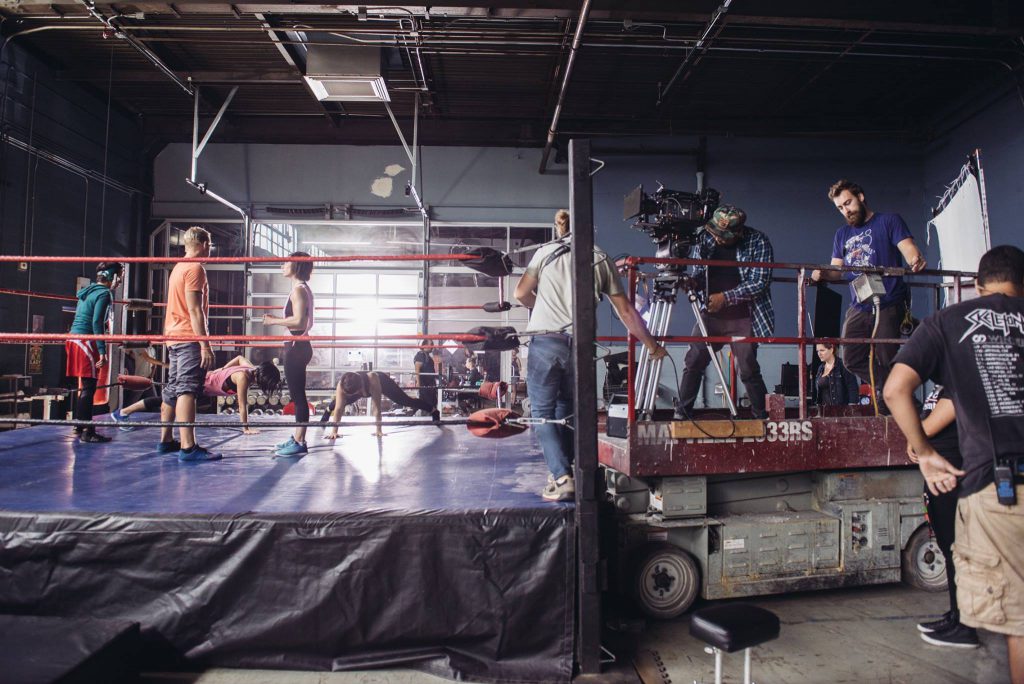
MSL: How does your understanding of the eventual “home(s)” for a work impact the way that you shape the work, if it does?
FM: I often am thinking as a producer regardless — whether I’m watching myself in the editing room or thinking about what I want to write. I think about, “What am I going to do with this project? Who am I making this for? When do I want to make it?” So one of the joys of making a short piece — that I can make with fewer resources and on my own, independently — is I can do it quickly and then sort of curate where I’m going to send it or who I’m going to send it to. For me, film festivals have been a huge part of my artistic growth. They saw me in my intersectional identity and wanted to amplify my voice as an artist before it was cool or trendy or sexy for anyone else to do it.
Now that I’ve worked on network television, I also think about, “Is this something I could pitch as a pilot for a much wider global audience? Or is this something I just want to make and put on the internet?” My sense of its platform definitely impacts the work, and also how much time I might spend on it now. I mean, you also gotta get paid! We have to survive as artists. That is definitely something that factors into decisions now.
Video: “The First Session – Trailer”: The video thumbnail shows a still from the trailer for the short film “The First Session,” directed by Ryan Logan. Mouzam Makkar (as Amina) and Fawzia Mirza (as Mona) hold hands and look just past the camera. They sit on a detailed piece of wooden furniture that is covered in textured pillows; there is other detailed wooden furniture behind them. Makkar wears a blue fitted shirt, a patterned scarf, and black pants, and looks expectant. Mirza wears jeans and a dark pink blouse with silver buttons; she looks like she may be trying to smile but is also conflicted. Along the bottom of the frame are logos indicating honors from the NBCUniversal Short Film Festival, Outfest Los Angeles LGBT Film Festival, Chicago South Asian Film Festival, and Palm Springs International Shortfest. Video courtesy of the artist.
MSL: How do you think about humor and satire functioning in your work, in general and especially when addressing more serious topics? Have the ways you use (or think about the uses of) comedy changed over time — as you’ve developed as an artist, in response to specific cultural moments or political events, or with shifts in other aspects of your life?
FM: Humor is a huge part of my work. Comedy, for me, is a tool to reach people when otherwise they might not be reached. Comedy’s a way of talking about divisive topics. Comedy’s a way to access people, find a connection, and then open up a new ability to potentially reach and impact each other. All of my work, really, uses humor, even if it seems like it’s really serious. And, on the flipside, if it seems like it’s really comedic, it also is always working on changing the narrative, subversively. Like in my short film, “The First Session”: Two characters were lesbian, all three characters were South Asian, all three characters had Muslim-sounding names, but the short film was not about that. It was about a lesbian couple having their first date at a therapist’s office. And so, even though you have this queer, Brown, Muslim world, you have a very absurd situation that’s allowing all audiences to access the film and find connection, humor, relatability, and joy in the characters.
“The Muslim Trump” is another great example. Until I made “The Muslim Trump,” I didn’t really see people speaking out against Donald Trump. Making “The Muslim Trump” was a way of using an absurd character to speak out against an absurd and offensive and hateful human being.
I think that you can tell my mental, emotional, creative, political, personal space based on what I’m working on at the time. Whether it’s something big or something small, it’s really telling of where I’m at.
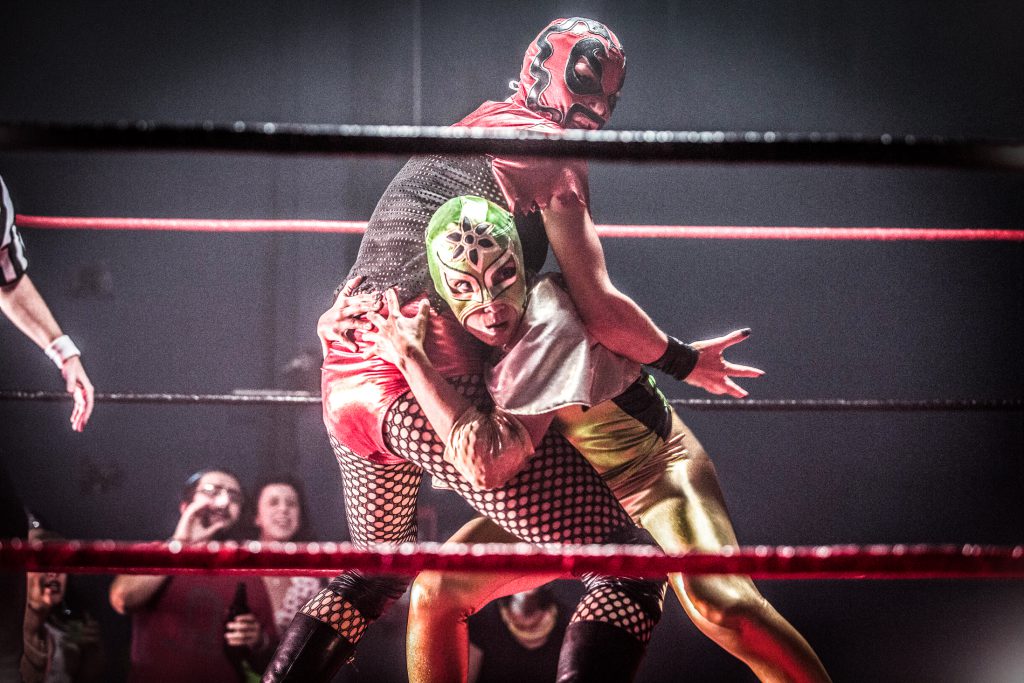
MSL: How did you get involved with “The Red Line” and what made you want to be involved? So far, what’s it like being on the writing team for a network TV show — especially as compared to self-producing so much of your own work — and what has surprised you about the experience?
FM: “The Red Line” was a project that Erica Weiss, one of the co-creators, reached out to me about. We knew each other’s work from the theater world, from the film world, from being hustlers in Chicago — because we know that Chicago artists are hustlers and work the hardest [laughs] in this industry in so many ways. Erica asked if I was interested in writing for television, then reached out to my team to have me interview for the show.
I’m not someone who thrives working in a space that doesn’t connect with my values and my strengths. There were a lot of connections for me to the project. “The Red Line” is a show that is about Chicago, it’s about people of color, about queer people, about people at the intersections, about violence, about the South Side of Chicago, about people finding connection and coming together across different communities. And so, a lot of the work that I’ve done up until this point and also my values as a person made this project exceptionally relevant to me. Caitlin Parrish and Erica Weiss — and Sunil Nayar, who’s one of the other show-runners — created a really beautiful, diverse, smart, funny, and familial writers’ room where it felt safe to share ideas and be your powerful, beautiful self.
Working for network television was a new world — with a studio, with executive producers — and also being paid your worth as an artist. It is the beginning of everything that I’ve worked towards as an artist, and the beginning of a lot more to come.
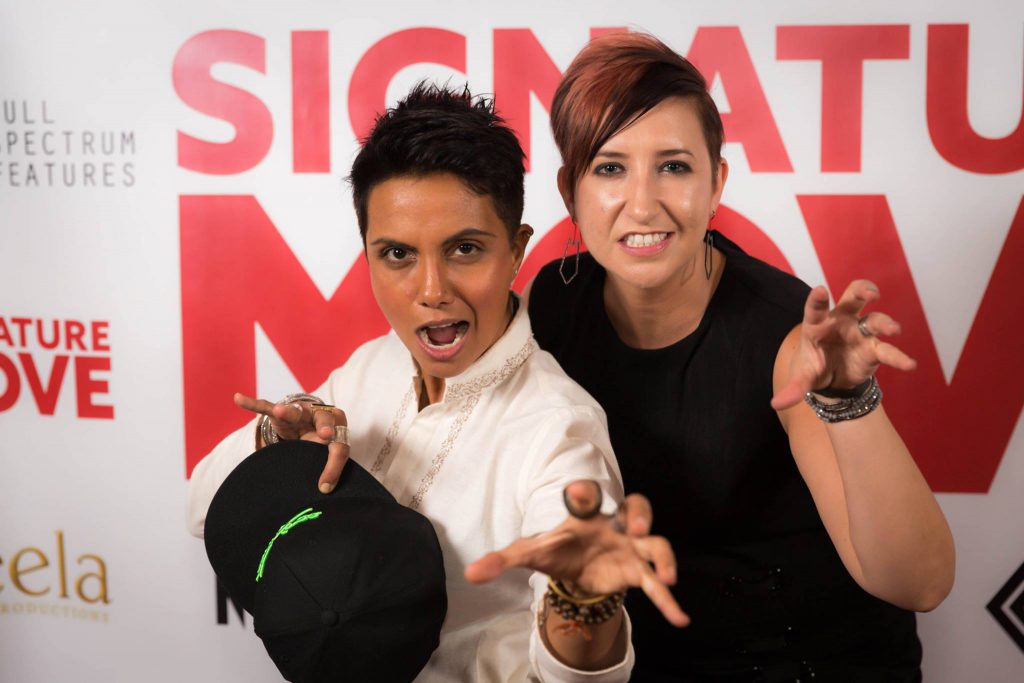
MSL: After many years in Chicago, you moved to LA to be part of the writing team for that show — which takes place in Chicago. To what extent does that distance challenge, help, or otherwise impact your writing process?
FM: LA is an exciting place to be because you can feel that this is where the work is happening. It is a place where artists are able to thrive, make a living, connect with other artists at the height of their craft. I’d been coming to LA for several years anyway — for work and meetings and relationship-building and writing and collaborations — so, for me, working in LA telling a story about Chicago was what I was already doing. And I do believe that everything happens for a reason.
MSL: What else are you working on now or next?
FM: Lisa Donato and I have some great partners on board as we will be pitching our half-hour comedy “Spunkle” in 2019. With Terrie Samundra, I am turning my one-woman show, “Me, My Mom & Sharmila,” into a screenplay. I have a sci-fi digital series called “A Date with Khan” that I’m working on with Chicagoans Sean Miller and Naz Khan that Sarita Choudhury just attached to. I’m also working on a short called “Five Times a Day” which shoots in April, to be directed by Tchaiko Omawale, produced by Kate Fisher, with Zamarin Wahdat as the DP. And I’m also just finished with a treatment for a comedy-drama digital series about Muslim spirits, also known as Jinn.
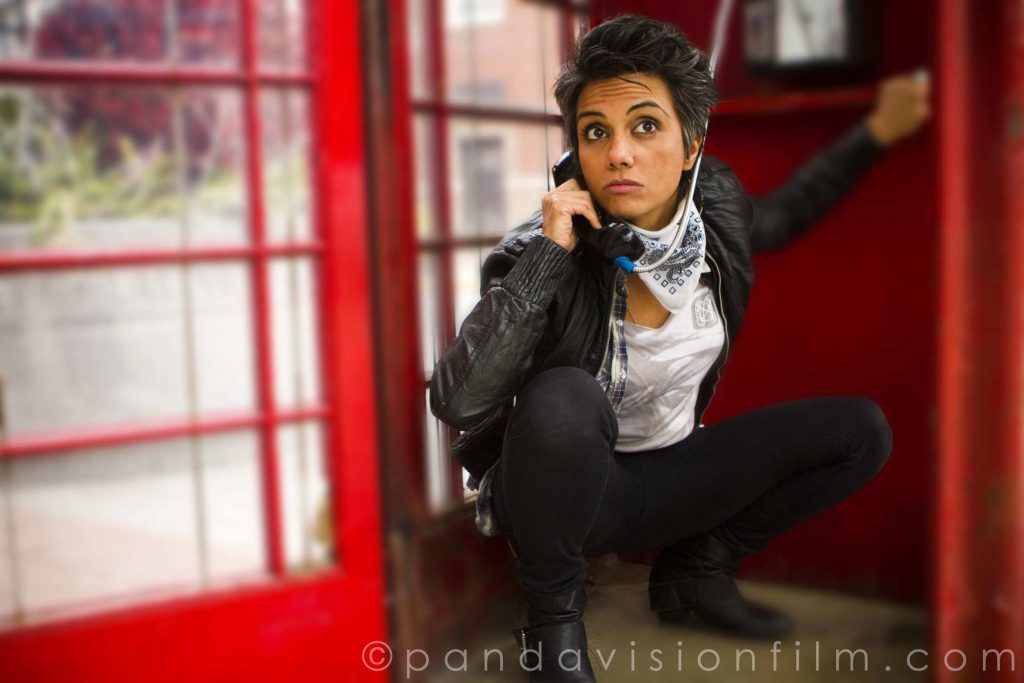
MSL: How do you decide what projects you pursue or opportunities you accept — in general and especially as your career has taken off? What have you learned or clarified about your own values or priorities as you’ve had to make those decisions?
FM: I consult with my literary agent and my managers and the other people really close in my emotional and collaborative sphere. As you get busier and more people ask you to work on projects, it’s easy to say yes without knowing “What is the thing that I need to focus on in this moment — or for the next few weeks or next few months?” I think it’s really important to understand also how you work as an artist. What do you need? Do you need space? Do you need to finish one thing and then start another? Can you write and work on multiple things at the same time? And also, what is the thing that you’re doing that is purely feeding you creatively, or feeding your momentum, or feeding your face — in other words, paying bills?
MSL: Whether when visioning new projects or engaged in the day-to-day work, what keeps you going and inspired? And how do you get it all done?
FM: If you’re like me, you have ups and downs. You have to stay self-motivated. You have to take care of yourself — your body and your mind. I keep going by actually living and being around really inspiring, good, kind people. I also like to be around people I admire, people I have worked with, but also people that I want to work with. I also need to go on walks. I need alone time. I need to work out. I like to go to the desert and hike. I like to stare off into space. I like drinking broth, and being still.
Video: “You Should Know This By Now — Fawzia Mirza #1”: Directed by Reena Dutt. The video thumbnail shows a video still from the “You Should Know This By Now” project. In medium-close-up, Mirza smiles at the camera. She wears a collared black shirt with white detailing and a silver necklace. The background is white, and wooden boxes of different dimensions are visible on the right-hand side of the frame. Video courtesy of the artist.
MSL: What are some of your favorite or most personally meaningful reactions that you’ve gotten to your work?
FM: I performed my play, “Me, My Mom & Sharmila,” in Pakistan in 2016, and afterward I got a Facebook message from a young girl. She said that she had come up to me but had been too nervous to speak, but she wanted to. She said that, being Pakistani and Muslim, she’d never seen someone talk about the things she was feeling inside. And that seeing me, seeing my play, hearing my experiences, changed her life, and made her feel like she was not alone. She said she realized she was queer and that she had to come out and she was coming out to me. It’s that kind of stuff that keeps you going.
MSL: Is there anything that you think people don’t talk (or ask) about enough with your work, that you wish that they did?
FM: I think we need to talk more about the power and complications of being queer and Muslim, and create safe spaces for those conversations. Because there are plenty of people I know who are on the right side of politics who still don’t understand that you can be Muslim and gay at the same time. There’s clearly a lot more work to be done.
MSL: Who or what are some of your most enduring creative influences, whether far past or recent? And what are you really into right now?
FM: Issa Rae was an influence. Bollywood’s an influence. I just watched the coming-of-age films “Eighth Grade,” “Jinn,” and “The Miseducation of Cameron Post,” and also “The Kominsky Method.” I just watched “Roma,” which is an epic film. I’m watching “I’m Sorry” and the Netflix shows “Sisters” and “Sex Education” and I’m into the Pop Culture Happy Hour podcast. I am listening to the Spotify Cosmic Playlists curated by Chani Nicholas and reading Randa Jarrar’s book “Him, Me, Muhammad Ali.” One of my favorite people to follow online is Samantha Irby.
MSL: Finally, what are you hopeful about?
FM: I’m thrilled to be working, but also doing the work on myself and creating the life I want. I’m hopeful about love. I’m hopeful about joy. I’m hopeful about what I’m going to do with my collaborators in 2019.
Featured image: Fawzia Mirza. In this medium-close-up shot, Mirza looks directly and confidently at the camera, smiling with pursed lips and pointing at the viewer with both hands. Mirza wears a long-sleeved denim shirt with a blue-on-blue, camouflage-like print and the top few snaps unsnapped. The cuffs of her shirt-sleeves are folded back, and she wears several bracelets and rings made of silver or wood. Photo by Bradley Murray, cropped to fit. Courtesy of the artist.

 Marya Spont-Lemus (she/her/hers/Ms.) is a fiction writer, interdisciplinary artist, and educator focused on teen creative, leadership, and professional development. She lives and works on the Southwest Side of Chicago. Follow her on Twitter and Tumblr.
Marya Spont-Lemus (she/her/hers/Ms.) is a fiction writer, interdisciplinary artist, and educator focused on teen creative, leadership, and professional development. She lives and works on the Southwest Side of Chicago. Follow her on Twitter and Tumblr.
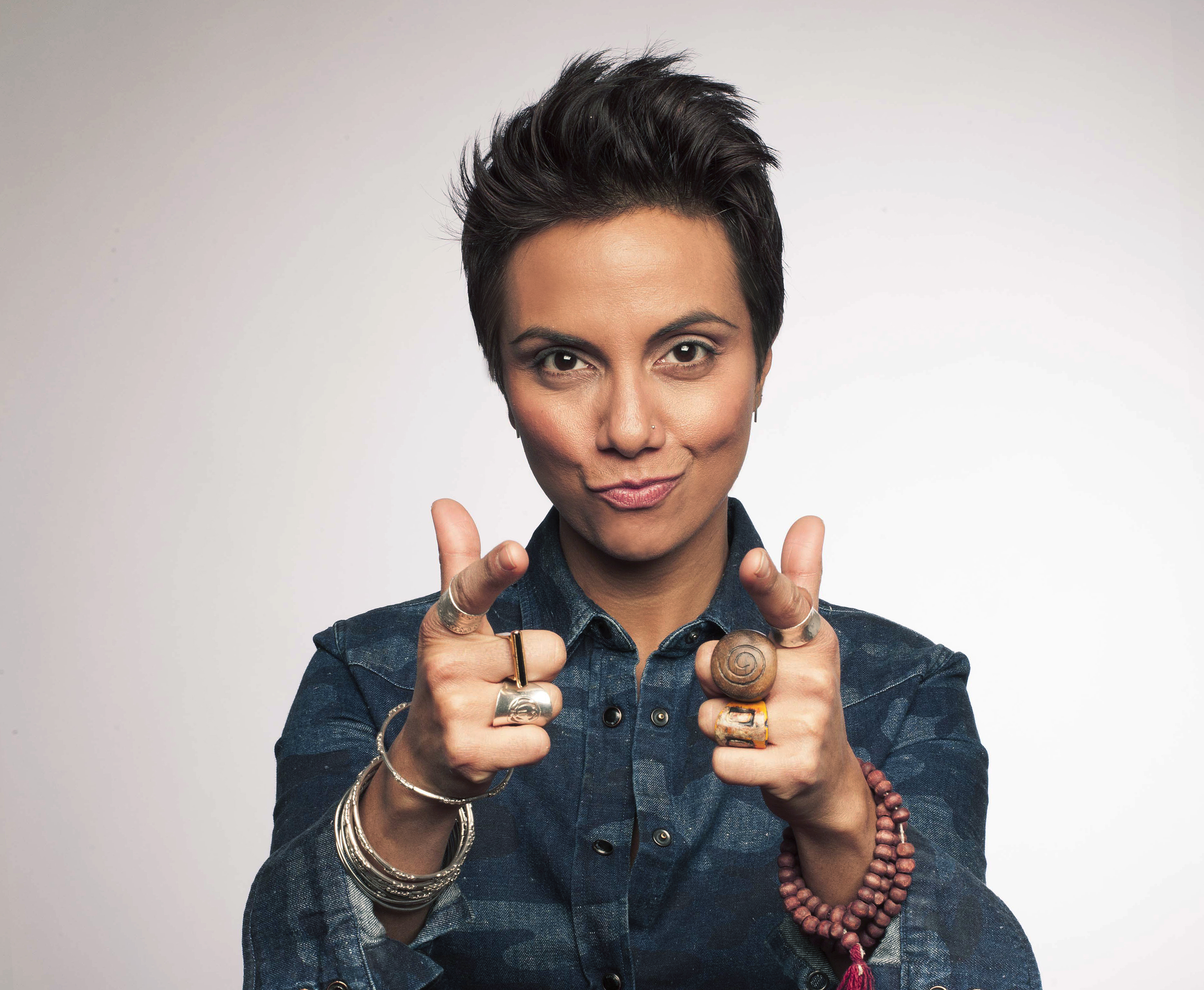
![[placeholder image]](https://sixtyinchesfromcenter.org/wp-content/uploads/2020/12/Quenna-Lené-Barrett_Headshot-300x99.png)
